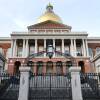The Supreme Court handed Iran's central bank a loss on Wednesday, saying Congress acted constitutionally when it passed a law saying nearly $2 billion in frozen Iranian funds should be turned over to Americans who U.S. courts had found were victims of Iranian terrorist attacks.
The issue here was not whether Iran should pay, instead it was whether Congress had infringed upon the territory of the judiciary by essentially awarding damages.
Here's how NPR's Nina Totenberg explained the case back when it was argued in January:
"In 2012, President Obama froze nearly $2 billion the Iranian central bank had concealed illegally in an account in New York. Congress then amended an existing anti-terrorism law to strengthen it. The new law specified those funds were to be used to pay off the court judgments that found Iran responsible for 19 separate terrorist attacks against Americans around the world."
Writing for a 6-2 majority, Justice Ruth Bader Ginsburg said historically Congress and the Executive Branch have been given wide latitude on issues of foreign policy. This is no different.
"By altering the law governing the attachment of particular property belonging to Iran, Congress acted comfortably within the political branches' authority over foreign sovereign immunity and foreign-state assets," Ginsburg wrote.
In an in unusual move, Justice Sonia Sotomayor joined Chief Justice John Roberts in his dissent.
He argued that this case was much bigger than a single law. This case, he wrote, is about a "basic principle." He adds:
"Section 8772 decides this case no less certainly than if Congress had directed entry of judgment for respondents. As a result, the potential of the decision today 'to effect important change in the equilibrium of power' is 'immediately evident.' Morrison v. Olson, 487 U. S. 654, 699 (1988) (Scalia, J., dissenting). Hereafter, with this Court's seal of approval, Congress can unabashedly pick the winners and losers in particular pending cases. Today's decision will indeed become a 'blueprint for extensive expansion of the legislative power' at the Judiciary's expense, Metropolitan Washington Airports Authority v. Citizens for Abatement of Aircraft Noise, Inc., 501 U. S. 252, 277 (1991), feeding Congress's tendency to "extend[ ] the sphere of its activity and draw[ ] all power into its impetuous vortex," The Federalist No. 48, at 309 (J. Madison)."Copyright 2016 NPR. To see more, visit http://www.npr.org/.



